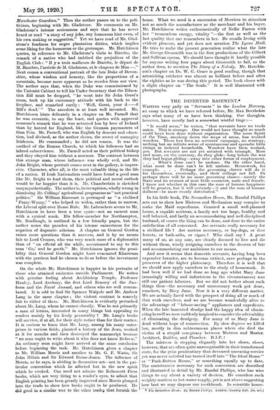THE DESERTED BASEMENT.*
Warns° very gaily on " Servants " in the London Mercury, an essay to which we have referred before, Mr. Max Beerbohm says what many of us have been thinking. Our thoughts, however, have mostly had a somewhat wistful tinge :- " It would seem," Ire writes, " that servants have no trade union. This is strange. One would not have thought so much could have been done without organization. The mere Spirit of the Time, sneaking down the steps of areas, has worked wonders. There has been no servants' campaign, no strategy, nothing but an infinite series of spontaneous and sporadic little risings in isolated households. Wonders have been worked, yes. But servants are not yet satiated with triumph. More and more, on the contrary, do they glide—long before the war they had begun gliding—away into other forms of employment. . . . What's done can't be undone. On the other hand, what must be done can't be left undone. Housework for example. . . . Perhaps the governing classes will do it for themselves, eventually, and their ceilings not fall. Or perhaps there will be no more governing classes—merely the State and its swarms of neat little overseers, male and female. I know not whether in this case the sum of human happiness will be greater, but it will certainly—it and the sum of human dullness—be more evenly distributed."
In his little book, The Servantless house, Mr. Randal Phillips sets out to show how Mistress and Mechanism may conspire to make the Maid superfluous. Granted a small well-planned house, a capable mistress, a family not too large, healthy and well behaved, and lastly an accommodating and well-disciplined husband, of course the thing can be done, and done to the entire satisfaction of all concerned. Arc servants really necessary for a civilized life ? Are motors necessary, or lap-dogs, or deer forests, or bath-salts, or cigars ? Who shall say ? A great many of us, at any rate, are clearly doomed to live and die without them, wisely resigning ourselves to the decrees of fate and accommodating our ambitions to our means.
And now it seems that domestic servants, having long been expensive luxuries, are to become extinct, save perhaps in tho preserves of the higher plutocracy. Therefore it is well that we should now apply ourselves to the study of housework. It had been well if we had done so long ago whilst Mary Jane (amazingly willing and industrious in the circumstances) was still our patient labourer. But we did not bother about such things then—the necessary and unnecessary work got done, somehow, by Mary Jane. Now it is a very different matter. We are actually faced with the prospect of doing all or much of that work ourselves, and we are become wonderfully alive to the advantage of " labour-saving " appliances and expedients. When the late lamented drudge had the happy idea of elimin- ating herself we were suddenly inspired to consider the advisability of eliminating the drudgery. For many of us Mary Jane is dead without hope of resurrection. By slow degrees we killed her, mostly in dim subterranean places where she died the victim of a stupid conspiracy between Mistress and Master, Architect, Builder, and Plumber. R.I.P. !
The mistress is stepping elegantly into her shoes, shoes, however, that arc often quite unrecognizable in their transformed state, for the grim penitentiary that devoured unceasing service yet was never satisfied has turned itself into " The Ideal Home " or " Push-Button House," or something equally up to date. The contrivances necessary for such conversion are described and illustrated in detail by Mr. Randal Phillips, who has wise things to say about a variety of devices. He considers such weighty matters as hot-water supply, yet is not above suggesting how best we may dispose our toothbrush. In scientific house-
The Screaniltse hour:. By Randal 110" London ; C'euntry Life. Bic act.]
management it is of course detail that counts. " Think out your work, then work out your thought," is an aphorism that might well be embroidered on every duster, emblazoned above the range, and incised upon the rolling-pin.
The new housewife has found an excellent substitute that can replace half the elbow-grease formerly required. It is brains. The only thing that deters most of us from instantly transform- ing our laborious dwellings into the up-to-date and scientifically equipped residences that Mr. Phillips so justly commends to us is the present high first cost of the necessary plant and improve- ments. The " Auto-flat " and " Gadget Grange " may not be attained without considerable payments to joiners, plumbers, electricians, and others ; but if these functionaries be wisely employed under expert direction, they will prove more profitable servants than Mary Jane and her sisterhood, who may now be reckoned to cost a round hundred pounds a year in board, lodging, and emoluments. At 5 per cent, per annum this, capitalized, represents £2,000. The debatable moral and sociological question quite apart, we are beginning to realize that it may actually be " good business " to spend anything up to this sum that we may dispense with the ministrations of even one human " helper and server."







































 Previous page
Previous page